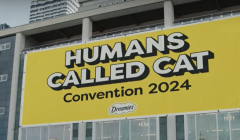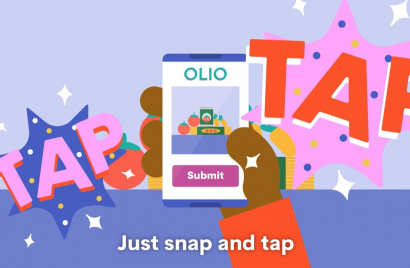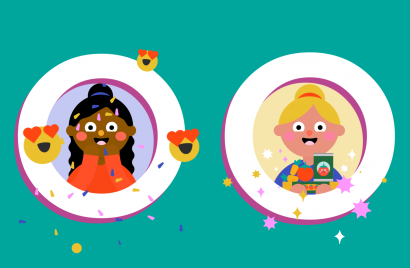
Dreamies investigation proves that the treats are irresistible to cats
The campaign by Adam&EveDDB concludes that the only cats who don’t love the pet treat are human Cats

Tessa Clarke, CEO & Co-Founder of food sharing app OLIO on behavioural change, local renaissance and the power of collaboration.

The beauty of humanity is that even in the darkest times it is still our instinct to look for the silver lining. And, even while the coronavirus crisis continues to sow uncertainty and fear across the country, there have been several positive outcomes. One has been around humanity’s impact on the environment. The other has been our shift to a more village mindset, to more of a focus on our local communities.
Both these factors are championed and built upon by the food sharing app OLIO. Founded in 2015, the app enables consumers to connect with their community but also, crucially, to reduce waste. “I’m a farmer’s daughter, and so have always hated food waste as I know how much hard work goes into producing the food in the first place,” says Tessa Clarke.
Clarke, the CEO and Co-Founder of OLIO, explains that the inspiration for the app came about when she was moving to a new country and found herself on moving day with uneaten but perfectly good food. She went on, what she calls, “on a bit of a wild goose chase” to try and find someone to give it to. While she knew there were surely many people who would’ve loved it, there was no way for Clarke to find them. And so, OLIO was born.
Over a third of all food produced globally goes to waste but, perhaps most poignantly, all the world’s one billion hungry people could be fed on less than a quarter of the food that is wasted in the UK, US and Europe. Behavioural change and a growth of awareness are, to Clarke, essential to move the needle.
For food waste in particular, it still hasn’t yet had its ‘plastics’ moment, despite being more devastating for the climate than plastic.
Tessa Clarke
“Coming into 2020 I was very excited that this was the year that would finally herald the start of action on the climate crisis,” says Clarke. But then COVID hit and disrupted every industry, every business and threatened every steadily growing initiative. After initially feeling like the crisis would derail the progress that had been made in the environmental space, Clarke tentatively shifted to a more optimistic outlook after watching people’s behaviour change under lockdown.
“When we first went into lockdown, research by Hubbub showed that 48% of people said they were wasting less food and over half of all people said they were valuing food more,” she explains. “Sadly as lockdown has lifted we’ve started to return to our more wasteful habits and according to a recent WRAP report the average level of food waste measured across four key products has seen a 31% increase since April, but still significantly below pre-lockdown levels.”
Six months since lockdown began and Clarke reveals that she feels the COVID crisis might just accelerate the transition towards sustainability because, she adds, “we’ve seen what we can do when we really put our minds to something, and we have a choice as to how we build back.” Her hope is that the crisis will remind people what is important and so, “draw a close to the era of mindless consumption that has prevailed for so long.”
“For food waste in particular, it still hasn’t yet had its ‘plastics’ moment, despite being more devastating for the climate than plastic,” says Clarke, making reference to the ‘Blue Planet’ effect that the BBC show had on people’s attitudes towards the harm that plastics cause to animals and our environment. Clarke’s hope is that food waste’s moment will “come sooner rather than later.” “If brand marketers respond to this, then we will hopefully see a new dawn of purposefulness in advertising. And not a moment too soon,” she adds.
OLIO recently released their first TV ad, created by Hell Yeah! a decision that Clarke says was taken in light of the growing volume of neighbour-to-neighbour shares since COVID first started. They’ve doubled since the beginning of lockdown, a momentum that Clarke wanted to capitalise on. The team felt TV offered them the best medium to meet their audience where they were, at home.
This narrowing of people’s focus to their more immediate surroundings sees the UK going through, says Clarke, “an awakening as to how important our local communities are.” “I think we’re on the cusp of a very interesting, and long overdue, local renaissance,” she adds. We have seen this become one of the more significant trends to come out of COVID as people’s priorities shift. She explains: “I believe that we will continue to fall out of love with unsustainable, impersonal brands that do nothing for the planet or our communities, and will increasingly want to shop, eat, work and live local.”
She believes that the COVID crisis has forced us all into a collective pause, a moment of consideration about the way we have been living our lives, a chance to reflect on what we want our future to look like. It has also thrown into stark relief the sheer scale of inequality rife throughout our society. “I very much hope that in the race to ‘get back to normal’ we don’t forget what we saw when our eyes were opened, and that we can harness our desire to ‘do better’ and convert it into meaningful action, starting today,” she says.
COVID has reminded us of just how much we can achieve when we set our minds to it and collaborate to survive.
Tessa Clarke
At the heart of OLIO’s proposition is the notion of community. Its purpose, Clarke explains, “is to harness the power of individuals and communities to help solve the climate crisis at scale, and within this our specific mission is to reduce food waste in the home.”
To further the brand’s mission, Clarke says she ensures the team she works alongside are “mission obsessed, not just mission aligned.” This allows them to keep the purpose at the heart of everything they do, to ensure it is reflected naturally across every channel.
“Through this crisis I’ve been reminded of the saying attributed to Charles Darwin which is that it’s not the strongest or most intelligent who wins, but the one who is quickest to adapt to change,” Clarke says. She is reflective as she remarks that the coronavirus crisis is simply one of many that humanity looks set to face with the climate crisis being of the most imminent.
Clarke believes that the power of collaboration will help people through the crisis, she explains: “COVID has reminded us of just how much we can achieve when we set our minds to it and collaborate to survive.” With over half of all food waste taking place in the home in developed countries, the shift needs to happen collectively to make a real difference to the planet. Clarke’s hope is that we will remember just how far this collaborative approach got us and harness its power for good moving forwards.


Looks like you need to create a Creativebrief account to perform this action.
Create account Sign inLooks like you need to create a Creativebrief account to perform this action.
Create account Sign in